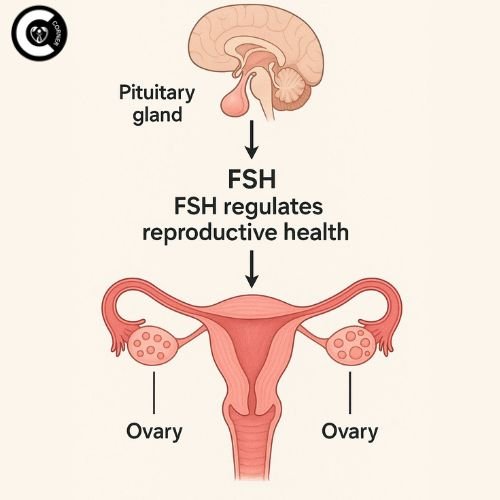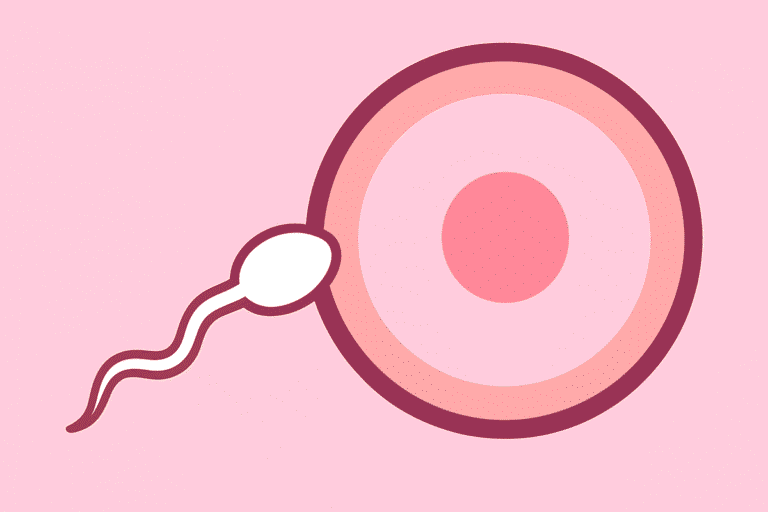Follicle-Stimulating Hormone (FSH), which is crucial for reproductive health, is produced by the pituitary gland. FSH helps ovarian follicles, which are where eggs develop, grow, and regulates the production of estrogen in women. Males’ testes produce sperm with the aid of FSH. Your menstrual cycle, fertility, and overall hormone balance can all be disrupted by excessively high or low FSH levels. According to recent research, natural remedies such as dietary modifications, stress management, and the use of herbal medications may help restore normal FSH levels. Next, we’ll examine seven scientifically supported strategies for effectively managing FSH levels.
Understanding FSH and Its Role in the Body
What Exactly Is FSH?
Luteinizing Hormone (LH) and FSH, a gonadotropin hormone, regulate the body’s reproduction. Women’s FSH levels fluctuate throughout their menstrual cycle:
- Follicular Phase: To aid in the ovaries’ follicle growth, Follicle-Stimulating Hormone levels rise.
- Ovulation: A mature egg is released when FSH and LH levels rise.
- Luteal Phase: A woman’s FSH levels decrease if she becomes pregnant and then rise again if she does not.
By acting on Sertoli cells in the testes, FSH helps men produce sperm consistently. A health issue like PCOS, hypothalamic dysfunction, or testicular or ovarian failure may be indicated by abnormal FSH levels in any gender.
7 Science-Backed Remedies to Naturally Balance FSH
1. Nutrient-Dense Diets for Hormonal Support
A diet rich in essential nutrients is necessary for the generation and regulation of hormones. Follicle-stimulating hormone levels were greater in women with low vitamin D levels, according to a study published in the Journal of Clinical Endocrinology & Metabolism. Omega-3 fatty acids, found in plant sources like flaxseeds and fatty fish like salmon, reduce inflammation and aid in hormone production. Antioxidants like vitamins C and E shield reproductive cells from oxidative stress, which can impair the function of the ovaries and testicles. Among the most crucial things to consume are leafy greens, berries, nuts, seeds, and foods rich in zinc, such as pumpkin seeds and oysters. Avoiding processed sugars and refined carbohydrates is equally important because they can alter hormone balance and increase insulin levels.
2. Stress Reduction with Adaptogens
Prolonged stress causes cortisol levels to rise, which can impair reproductive health by reducing FSH production. Adaptogenic herbs like ashwagandha have been proven in studies, including one published in the Indian Journal of Psychological Medicine, to improve pituitary function and reduce cortisol levels by up to 28%. Clinical research have indicated that maca root, another adaptogen, may improve fertility and FSH balance. You may assist your body in coping with stress and maintain stable hormones by incorporating these herbs into your daily routine as teas, tablets, or powders.
3. Moderate Exercise for Hormonal Equilibrium
Because exercise has a U-shaped effect on FSH levels, excessive or insufficient exercise may upset the hormonal balance. Yoga, brisk walking, and strength training are examples of moderate exercise that improve blood flow to the reproductive organs and reduce cortisol levels, which rise during stressful situations. For instance, yoga improves ovarian function in PCOS-afflicted women, while excessive endurance exercise may result in decreased FSH levels in athletes. Try to get 30 to 45 minutes of moderate activity most days of the week to help control FSH
Herbal Remedies: Vitex (Chasteberry)
Vitex agnus-castus, commonly known as chasteberry, is a well-researched herb that supports healthy hormones. It functions by altering the pituitary gland’s release of luteinizing hormone (LH) and FSH. According to a 2013 study published in the Journal of Phytotherapy Research, women with PCOS who took Vitex experienced more regular periods and improved FSH/LH ratios. It may take three to six months for the effects to manifest, but the normal dosage is 20 to 40 mg of standardized extract daily. Remember that using Vitex while pregnant is not safe.
5. Prioritizing Sleep Quality
Sleep deprivation disrupts the synthesis of melatonin, a hormone that closely resembles FSH. Sleep deprivation can exacerbate hormonal imbalances by altering the release of FSH and increasing cortisol levels. Adults should aim for 7 to 9 hours of uninterrupted sleep each night. Maintaining a consistent evening routine, avoiding gadgets right before bed, and creating a cool, dark sleeping environment are all ways to improve your quality of sleep. Taking melatonin or magnesium supplements (as directed by a physician) may also help you sleep well.
Also Read: How To Identify Symptoms of Perimenopause
6. Avoiding Endocrine-Disrupting Chemicals
Endocrine disruptors, such as parabens, phthalates, and bisphenol A (BPA), function similarly to hormones and inhibit FSH signaling. These substances are present in plastics, cosmetics, and insecticides. To lessen your exposure, choose glass or stainless steel containers, organic produce, and personal care items free of artificial fragrances and parabens. You can identify safer household and cosmetic products by using databases maintained by the Environmental Working Group (EWG).
7. Acupuncture for Hormonal Regulation
Hormone Balance with Acupuncture
Science has demonstrated that acupuncture, a traditional Chinese medicine, can help balance FSH levels. According to a study published in Fertility and Sterility, women with premature ovarian failure who received acupuncture for three months showed improved blood flow to their ovaries and significantly lower levels of FSH. Acupuncture stimulates the hypothalamus-pituitary-ovarian axis, which is thought to improve hormonal communication. One to two sessions each week for three to six months is a typical schedule.
Conclusion: A Holistic Path to FSH Balance
Striking equilibrium FSH requires a comprehensive approach that considers environment, sleep, stress, and diet. By eating nutrient-dense foods, taking adaptogenic herbs, exercising modestly, and living in a toxin-free environment, people can preserve their hormonal balance and enhance their reproductive health. You can make these strategies work for you by recording your symptoms and progress. Always utilize these methods in conjunction with professional medical guidance for the greatest results.





[…] Also Read: How To Boost FSH Level Naturally […]
[…] Also read: Can You Balance FSH Naturally? 7 Proven Remedies Backed by Science […]